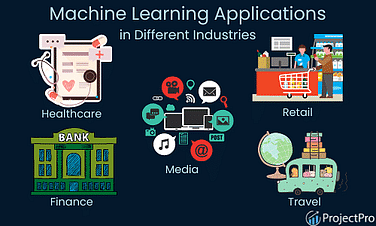Machine learning, a term that has been buzzing around lately, has captured the attention of various industries due to its potential to revolutionize the way we work and live. This cutting-edge technology allows computers to learn and make predictions or decisions without explicit programming. In this article, we will explore what machine learning is all about and delve into its applications across different sectors. Join us as we uncover the fascinating world of machine learning and discover how it is transforming industries faster than we can imagine.
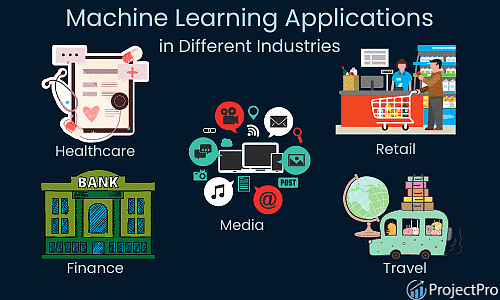
This image is property of dezyre.gumlet.io.
Healthcare Industry
Diagnosis and Treatment
In the healthcare industry, machine learning plays a critical role in the field of diagnosis and treatment. By analyzing vast amounts of medical data, machine learning algorithms can identify patterns and make accurate predictions about diseases and conditions. This technology assists healthcare professionals in making more precise diagnoses and creating personalized treatment plans for patients. Machine learning algorithms can analyze medical images, such as X-rays and MRIs, to assist radiologists in detecting and classifying abnormalities. Additionally, these algorithms can analyze patient data, such as medical histories and symptoms, to predict the likelihood of specific diseases and recommend appropriate treatment options.
Drug Discovery and Development
Machine learning is revolutionizing the process of drug discovery and development in the healthcare industry. By analyzing vast amounts of data, including genetic and molecular information, machine learning algorithms can identify potential drug targets and predict the efficacy of various compounds. This technology accelerates the discovery of new drugs and reduces the time and cost needed for their development. Machine learning algorithms can also predict adverse drug reactions and assist in optimizing dosages, ultimately improving patient safety.
Patient Monitoring and Care
Machine learning is transforming patient monitoring and care by enabling the analysis of real-time data to detect early signs of deterioration or worsening conditions. This technology utilizes wearable devices, such as smartwatches and biosensors, to continuously collect data on vital signs, activity levels, and other relevant metrics. Machine learning algorithms can analyze this data and provide healthcare professionals with actionable insights, prompting timely interventions and improving patient outcomes. Furthermore, machine learning can help in predicting readmissions and identifying patients who are at a higher risk of developing complications, allowing healthcare providers to allocate resources more efficiently.
Healthcare Operations and Administration
Machine learning is also making significant contributions to healthcare operations and administration. These algorithms can analyze large datasets to identify trends, optimize workflows, and improve the efficiency of healthcare systems. For example, machine learning can be used to predict patient volumes, enabling hospitals to allocate staff and resources appropriately. It can also assist in automating administrative tasks, such as medical coding and billing, freeing up healthcare professionals to focus more on patient care. Machine learning algorithms can also identify potential fraud or abuse in healthcare claims, helping to prevent fraudulent activities and reduce financial losses.
Financial Industry
Fraud Detection and Prevention
Machine learning plays a vital role in detecting and preventing fraud in the financial industry. By analyzing large volumes of transactional data, machine learning algorithms can identify patterns and anomalies that indicate fraudulent activity. These algorithms can continuously learn from new data, increasing their accuracy and adaptability over time. Machine learning can help financial institutions detect various types of fraud, including credit card fraud, identity theft, and money laundering. By alerting investigators to potential fraud cases, machine learning algorithms enable swift action and minimize financial losses.
Risk Assessment
In the financial industry, machine learning algorithms are used for risk assessment to evaluate the creditworthiness of individuals and businesses. By analyzing historical data, such as payment history, income levels, and credit scores, machine learning algorithms can assess the likelihood of default or delinquency. This technology allows lenders and financial institutions to make more informed decisions about loan approvals, interest rates, and credit limits. Machine learning algorithms can also identify patterns in market data and assist in predicting stock market movements, helping traders and investors manage their risk exposure.
Algorithmic Trading
Machine learning is transforming the financial industry with the advent of algorithmic trading. These algorithms analyze vast amounts of market data, such as historical prices, trading volumes, and news sentiment, to make automated trading decisions. By utilizing machine learning, traders can identify complex patterns and predict market trends with greater accuracy. Algorithmic trading not only increases the efficiency of trading operations but also reduces human bias and emotion-driven decisions, resulting in improved trading performance.
Customer Service
Machine learning technologies are being employed in the financial industry to enhance customer service experiences. Chatbots and virtual assistants are powered by machine learning algorithms that can understand and respond to customer queries accurately and efficiently. These virtual assistants can analyze customer interactions, such as emails and social media posts, to identify patterns and sentiment. By providing personalized and timely responses, machine learning-powered customer service tools improve customer satisfaction and help financial institutions build stronger relationships with their clients.
Credit Scoring
Machine learning algorithms are used in credit scoring to evaluate the creditworthiness of individuals and businesses. By analyzing vast amounts of data, including financial indicators, payment history, and demographic information, machine learning algorithms can generate credit scores that accurately reflect the likelihood of default. This technology enables lenders to make informed decisions about loan approvals and interest rates. Machine learning algorithms also help in identifying potential risks and detecting fraudulent applications, contributing to a more secure and reliable credit evaluation process.

This image is property of www.wordstream.com.
Retail Industry
Demand Forecasting
Machine learning is transforming demand forecasting in the retail industry by analyzing historical sales data, market trends, and various external factors. These algorithms can accurately predict future demand for products and services, enabling retailers to optimize their inventory levels and avoid stockouts or overstocks. By accurately predicting demand, retailers can reduce costs associated with inventory management while improving customer satisfaction by ensuring the availability of desired products.
Personalized Marketing
Machine learning algorithms are powering personalized marketing campaigns in the retail industry. By analyzing customer behavior, preferences, and purchase history, these algorithms can create personalized recommendations and offers. This technology enables retailers to deliver targeted advertisements and promotions to individual customers, increasing the likelihood of conversion and customer loyalty. By understanding customer preferences and needs, machine learning algorithms help retailers tailor their marketing efforts and deliver a more personalized shopping experience.
Inventory Management
Machine learning algorithms are revolutionizing inventory management in the retail industry. By analyzing sales data, seasonality, and other relevant factors, these algorithms can optimize inventory levels and minimize holding costs. By accurately predicting demand and identifying purchasing patterns, machine learning enables retailers to improve their supply chain efficiency, reduce stockouts, and avoid unnecessary inventory expenses. This technology enhances the overall profitability and competitiveness of retailers.
Pricing Optimization
Machine learning is enabling pricing optimization in the retail industry by analyzing market dynamics, competitors’ pricing strategies, and customer behavior. These algorithms can generate price recommendations that maximize profitability while considering factors such as demand elasticity and competitive positioning. By dynamically adjusting prices based on real-time data and market trends, retailers can optimize their pricing strategies and increase revenue. Machine learning algorithms also help retailers identify price-sensitive customers and deliver targeted pricing strategies.
Customer Segmentation
Machine learning algorithms contribute to customer segmentation in the retail industry by analyzing customer data and clustering individuals into distinct groups based on their preferences, behavior, and demographics. By identifying different customer segments, retailers can tailor their marketing campaigns and strategies to better serve specific customer groups. This technology allows retailers to provide personalized experiences, enhance customer satisfaction, and improve customer retention. By understanding the unique needs of each segment, machine learning helps retailers create targeted product offerings and marketing messages.
Manufacturing Industry
Quality Control
Machine learning algorithms play a significant role in quality control in the manufacturing industry. By analyzing sensor data, machine learning algorithms can detect anomalies and identify deviations from desired production processes. This technology enables manufacturers to identify potential issues or defects early on, reducing waste, and ensuring the delivery of high-quality products to customers. Machine learning algorithms can also optimize quality control by providing real-time feedback and insights to operators, enabling them to make immediate adjustments and improve production efficiency.
Predictive Maintenance
Machine learning is revolutionizing predictive maintenance in the manufacturing industry. By analyzing sensor data, historical maintenance records, and other relevant information, machine learning algorithms can predict equipment failures or performance degradation. This technology enables manufacturers to schedule maintenance activities proactively, reducing unplanned downtime, and optimizing maintenance costs. By leveraging machine learning, manufacturers can transition from a reactive to a proactive maintenance approach, improving overall equipment reliability and minimizing production disruptions.
Supply Chain Management
Machine learning algorithms are transforming supply chain management in the manufacturing industry by optimizing inventory levels, reducing lead times, and improving overall logistics efficiency. By analyzing historical data, market trends, and various external factors, these algorithms can accurately predict demand and optimize inventory levels across the supply chain. This technology improves the accuracy of demand forecasting, reduces stockouts and overstocks, and enhances the overall competitiveness of manufacturers. Machine learning algorithms also help in identifying bottlenecks and optimizing transportation routes, resulting in cost savings and improved customer service.
Process Optimization
Machine learning is being employed in the manufacturing industry to optimize various production processes and improve overall operational efficiency. By analyzing data from sensors, machines, and other sources, machine learning algorithms can identify patterns and optimize parameters for maximum productivity. This technology enables manufacturers to identify inefficiencies, reduce energy consumption, and optimize resource allocation. By uncovering hidden patterns and correlations, machine learning algorithms help manufacturers make data-driven decisions to optimize their processes and achieve higher levels of productivity.
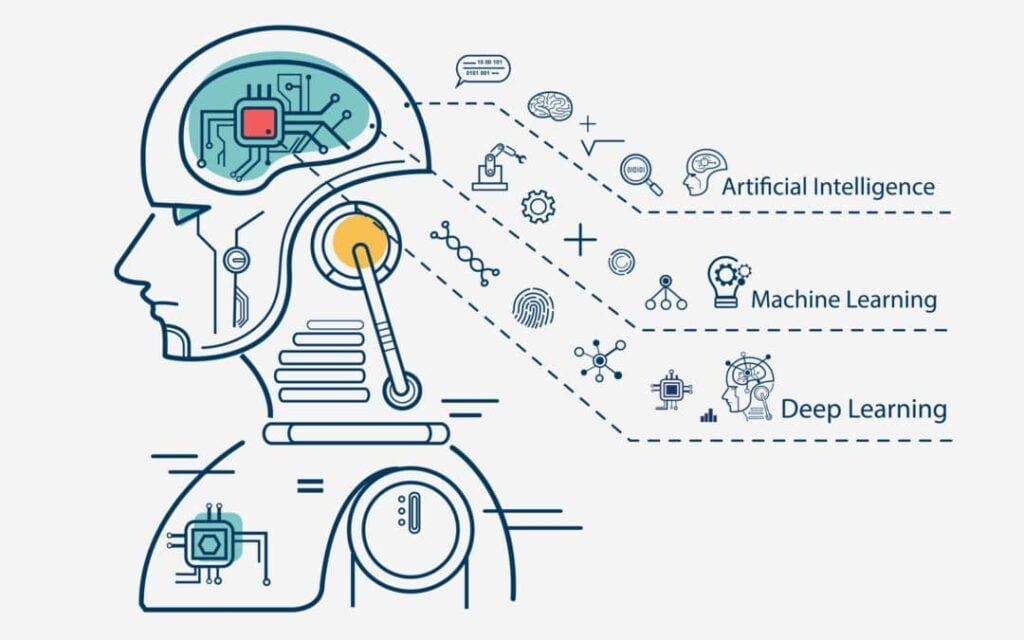
This image is property of www.atriainnovation.com.
Transportation Industry
Route Optimization
Machine learning algorithms are transforming route optimization in the transportation industry. By analyzing historical traffic data, weather conditions, and other relevant factors, these algorithms can generate optimized routes that consider factors such as travel time, fuel consumption, and vehicle capacity. This technology enables transportation companies to reduce transport costs, improve operational efficiency, and enhance overall customer satisfaction. By dynamically adjusting routes based on real-time data, machine learning algorithms help transportation companies respond to changing conditions and deliver goods more effectively.
Predictive Maintenance
Similar to the manufacturing industry, machine learning is revolutionizing predictive maintenance in the transportation industry. By analyzing sensor data, historical maintenance records, and other relevant information, machine learning algorithms can predict equipment failures or performance degradation. This technology allows transportation companies to proactively schedule maintenance activities, minimizing unplanned downtime and ensuring the reliability of their fleet. By reducing maintenance costs and optimizing fleet availability, machine learning algorithms help transportation companies improve profitability and customer service.
Autonomous Vehicles
Machine learning is at the forefront of the development and deployment of autonomous vehicles in the transportation industry. By analyzing sensor data, machine learning algorithms enable vehicles to perceive their environment, make decisions, and navigate safely. This technology is crucial for the development of self-driving cars, drones, and other autonomous vehicles. Machine learning algorithms continuously learn from real-world data, allowing autonomous vehicles to adapt to changing road conditions, improve their performance, and ensure passenger safety. The implementation of machine learning in autonomous vehicles has the potential to revolutionize transportation, offering increased safety, efficiency, and convenience.
Energy Industry
Grid Management
Machine learning algorithms are transforming grid management in the energy industry by optimizing the distribution and consumption of electricity. By analyzing historical and real-time data, these algorithms can predict electricity demand, balance supply and demand, and optimize the operation of power grids. This technology enables energy companies to improve energy distribution efficiency, reduce costs, and ensure a reliable power supply. By leveraging machine learning, energy companies can make data-driven decisions to optimize grid performance and enhance the integration of renewable energy sources.
Power Demand Forecasting
Machine learning algorithms are employed in the energy industry to forecast power demand accurately. By analyzing historical data, weather patterns, and other relevant factors, these algorithms can predict future energy consumption levels with high accuracy. This information is vital for energy companies to plan their power generation, allocate resources, and ensure a reliable supply. By improving power demand forecasting, machine learning algorithms help energy companies optimize their operations, reduce costs, and support the transition to a more sustainable and efficient energy system.
Energy Optimization
Machine learning is playing a crucial role in optimizing energy consumption and improving energy efficiency in various applications. By continuously analyzing real-time data from sensors and smart meters, machine learning algorithms can identify patterns, detect anomalies, and optimize energy consumption in buildings, manufacturing processes, and other sectors. This technology enables energy companies and consumers to reduce their carbon footprint, lower energy costs, and contribute to a more sustainable energy future. By optimizing energy consumption, machine learning algorithms support the efficient use of resources and promote environmental sustainability.
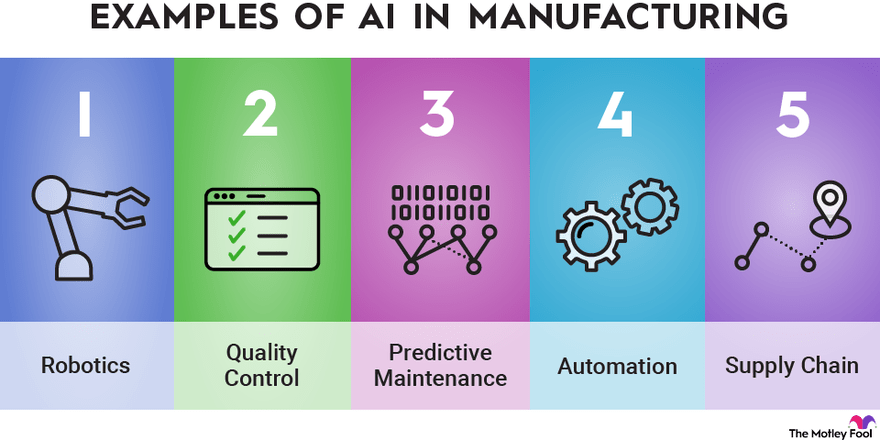
This image is property of m.foolcdn.com.
Entertainment Industry
Recommendation Systems
Machine learning algorithms are powering recommendation systems in the entertainment industry, helping users discover relevant content. By analyzing user behavior, preferences, and past interactions, these algorithms can provide personalized recommendations for movies, music, books, and other forms of entertainment. This technology enables entertainment platforms to engage users, increase content consumption, and enhance user satisfaction. By leveraging machine learning, entertainment companies can deliver tailored content recommendations, improving the overall user experience and driving customer loyalty.
Content Creation and Curation
Machine learning algorithms are being employed in the entertainment industry to create and curate content. Natural language processing algorithms can generate personalized news articles, blog posts, and social media content. By learning from vast amounts of data, these algorithms can mimic human writing style and generate content that resonates with users. Additionally, machine learning algorithms can analyze and categorize large amounts of multimedia content, improving content discovery and enabling efficient content curation. This technology allows entertainment companies to automate content creation and recommendation processes, increasing their productivity and relevance.
Personalized User Experience
Machine learning algorithms contribute to creating personalized user experiences in the entertainment industry. By analyzing user behavior, preferences, and historical data, these algorithms can customize interfaces, recommendations, and content based on individual preferences. Whether it is personalizing a streaming service’s homepage or tailoring gaming experiences, machine learning algorithms enable entertainment companies to deliver unique and engaging user experiences. By understanding user interests and preferences, machine learning algorithms enhance user satisfaction, increase engagement, and drive customer loyalty.
Education Sector
Adaptive Learning
Machine learning algorithms are transforming education by enabling adaptive learning experiences tailored to individual students. By analyzing student performance, learning patterns, and feedback, these algorithms can personalize educational content, pacing, and interventions. This technology allows educators to provide customized learning experiences that address each student’s strengths, weaknesses, and learning styles. Machine learning algorithms monitor student progress, identify areas of improvement, and provide timely feedback to optimize learning outcomes. By leveraging machine learning, education systems can enhance the effectiveness and efficiency of education delivery.
Personalized Tutoring
Personalized tutoring is being revolutionized by machine learning algorithms in the education sector. These algorithms can analyze student performance, learning styles, and individual needs to design tailored tutoring experiences. By adapting content, pacing, and instruction to each student, machine learning algorithms enable tutors to provide one-on-one support that maximizes learning outcomes. This technology allows students to receive personalized attention, practice at their own pace, and receive immediate feedback. By leveraging machine learning, personalized tutoring can be more scalable, cost-effective, and accessible to a wider range of students.
Educational Analytics
Machine learning algorithms are transforming educational analytics by analyzing vast amounts of educational data to identify patterns and make data-driven decisions. These algorithms can analyze student performance, attendance, engagement, and other relevant metrics to identify areas of improvement and optimize educational processes. By leveraging machine learning, educational institutions can enhance their understanding of student behavior, predict student outcomes, and implement interventions to support student success. Machine learning algorithms enable educators and policymakers to make informed decisions to improve curriculum design, teaching methods, and student support systems.
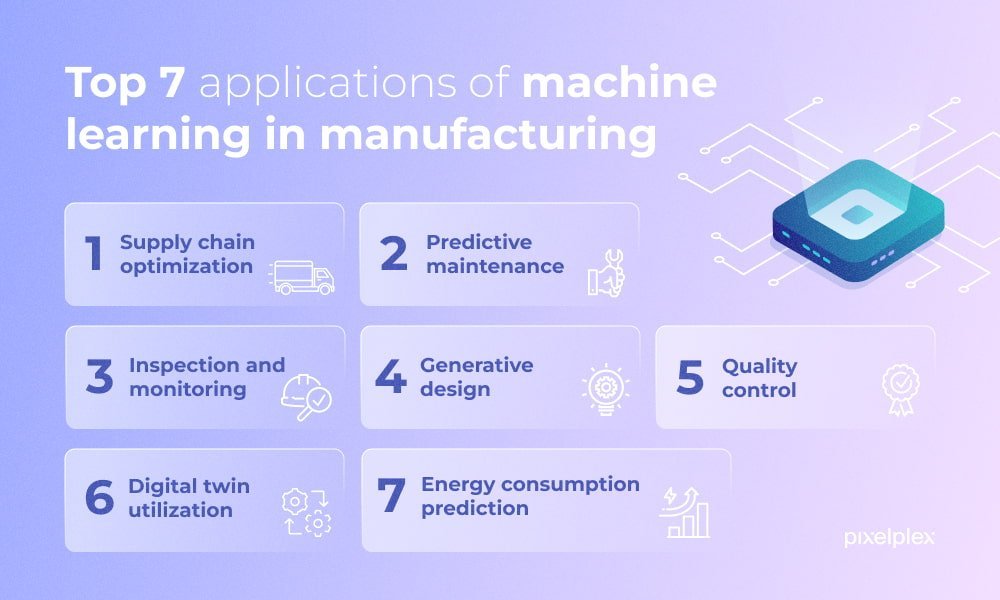
This image is property of pixelplex.io.
Marketing and Advertising Industry
Customer Segmentation
Machine learning algorithms play a crucial role in customer segmentation in the marketing and advertising industry. By analyzing customer data, behavior, and preferences, these algorithms can categorize individuals into distinct groups based on similarities and differences. This technology allows marketers to tailor their marketing campaigns, content, and offers to target specific customer segments effectively. By understanding the unique needs and preferences of each segment, machine learning algorithms enable marketers to improve the relevance and effectiveness of their marketing efforts and drive customer engagement and conversion.
Targeted Advertising
Machine learning algorithms are transforming targeted advertising by analyzing vast amounts of data to deliver personalized ads to individual users. By analyzing user behavior, demographics, and previous interactions, these algorithms can present ads that are relevant and appealing to each user. This technology enables advertisers to reach the right audience at the right time, increasing the effectiveness of their campaigns and maximizing return on investment. By leveraging machine learning, targeted advertising can be more precise, cost-effective, and result in higher customer engagement and conversion rates.
Campaign Optimization
Machine learning algorithms are employed in the marketing and advertising industry to optimize marketing campaigns and improve overall performance. By continuously analyzing campaign data, user feedback, and market trends, these algorithms can recommend adjustments to campaign strategies, targeting, and messaging. This technology allows marketers to optimize their campaigns in real-time, improving key performance metrics such as click-through rates, conversions, and return on investment. By uncovering hidden patterns and correlations in campaign data, machine learning algorithms support data-driven decision-making and enable marketers to achieve better campaign outcomes.
Conversion Rate Optimization
Machine learning algorithms are transforming conversion rate optimization in the marketing and advertising industry. By analyzing website and landing page data, user behavior, and other relevant factors, these algorithms can identify areas for improvement and recommend changes to maximize conversion rates. This technology enables marketers to optimize their websites, landing pages, and user experiences to maximize desired outcomes such as sales, sign-ups, or downloads. By continuously analyzing user data and adapting to user preferences, machine learning algorithms help marketers optimize their conversion strategies and improve overall campaign performance.
Agriculture Industry
Crop Yield Prediction
Machine learning algorithms play a vital role in crop yield prediction in the agriculture industry. By analyzing various factors such as weather data, soil conditions, and historical crop yields, these algorithms can predict future crop yields with high accuracy. This information is crucial for farmers and agronomists to optimize their farming practices, allocate resources effectively, and make informed decisions about crop selection and planting strategies. By leveraging machine learning, farmers can improve productivity, maximize crop yields, and minimize environmental impact.
Precision Farming
Machine learning is transforming precision farming practices in the agriculture industry. By analyzing sensor data, satellite imagery, and other relevant information, machine learning algorithms can provide valuable insights about soil conditions, plant health, and irrigation needs. This technology enables farmers to apply resources, such as water, fertilizers, and pesticides, precisely where and when they are needed, optimizing their usage and reducing waste. By utilizing machine learning, farmers can enhance the efficiency, sustainability, and profitability of their operations while minimizing the environmental impact.
Livestock Monitoring
Machine learning algorithms are employed in livestock monitoring to optimize animal health and welfare. By analyzing sensor data from wearable devices, machine learning algorithms can detect signs of stress, disease, or other health issues in livestock. This technology enables farmers to monitor their animals’ well-being in real-time, identify potential problems early on, and take timely preventive measures. By leveraging machine learning, farmers can improve animal productivity, reduce veterinary costs, and ensure the overall health and welfare of their livestock.

